Chicago migrant crisis fans flames of Illinois crime: retired police chief
Criminal enterprises in the Chicago area are benefiting from the migrant crisis as they recruit illegal migrants to carry out crimes with little legal repercussions, a retired Illinois police chief says.
Criminal enterprises in the Chicago area are benefiting from the migrant crisis as they recruit illegal immigrants to carry out crimes with little legal repercussions, a former Illinois police chief says.
"The frustration with this migrant crime is really, I think, going to boil over," retired Riverside Police Chief Tom Weitzel told Fox News Digital in a Zoom interview Monday. "You can pull up any article and see that some of these migrants are being arrested three and four and five times, over and over again, and released to commit more crime. … It's not an exaggeration to say that it's a revolving door. And the police officers are saying, ‘Just forget it. Why bother? Why bother even making the arrest?’"
Chicago and its surrounding areas have been the target of repeated migrant crimes, including quiet suburban malls seeing groups of people who illegally entered the U.S. ripping off department stores such as Macy’s.
Since August 2022, Chicago has seen an estimated 35,000 migrants flood the city after they illegally crossed the southern border in Texas, which bussed or flew them north.
STRING OF RETAIL THEFTS, BURGLARIES BY MIGRANTS PLAGUING CHICAGO SUBURB: AUTHORITIES

Retired Riverside Police Chief Tom Weitzel (Tom Weitzel)
Weitzel served as police chief of Riverside, a suburban village in Cook County located about five miles outside Chicago, from 2008 to 2021, when he retired. He served in law enforcement for 37 years, which included him being ambushed and shot in the line of duty in 1987 by Chicago criminals.
The former police chief said that before the migrant crisis exploded in northern cities, Chicago was already dealing with 2020’s crime wave that seeped into suburban towns.
"Individuals from the city, gang members, and even gang enterprises, would send individuals out to the suburbs to commit crimes at the suburban malls or residential areas for burglaries. And they would always flee back east to Chicago. That was a pattern that happened every single week," Weitzel said of crime issues pre-migrant crisis.
Now, the pool of criminals has seemingly expanded as some migrants land in the city and link up with criminals, gangs and criminal businesses that show them the ropes on how and where to commit crime, Weitzel said.
Migrants are dropped off at landing zones and "immediately targeted by these organizations to go out and commit crime," Weitzel said.
"Because would a migrant know where Oak Brook, Illinois, is, which has a very large, high-end shopping mall? Or Lombard, Illinois, or North Riverside, Illinois, which are all communities that have malls. They have no idea those communities even exist. They would have no idea how to get there, where they're located from the city of Chicago transportation. And these criminal enterprises are providing that for these migrants," he said.
TEXAS BUS COMPANY SUING CHICAGO OVER MIGRANT DROP-OFFS
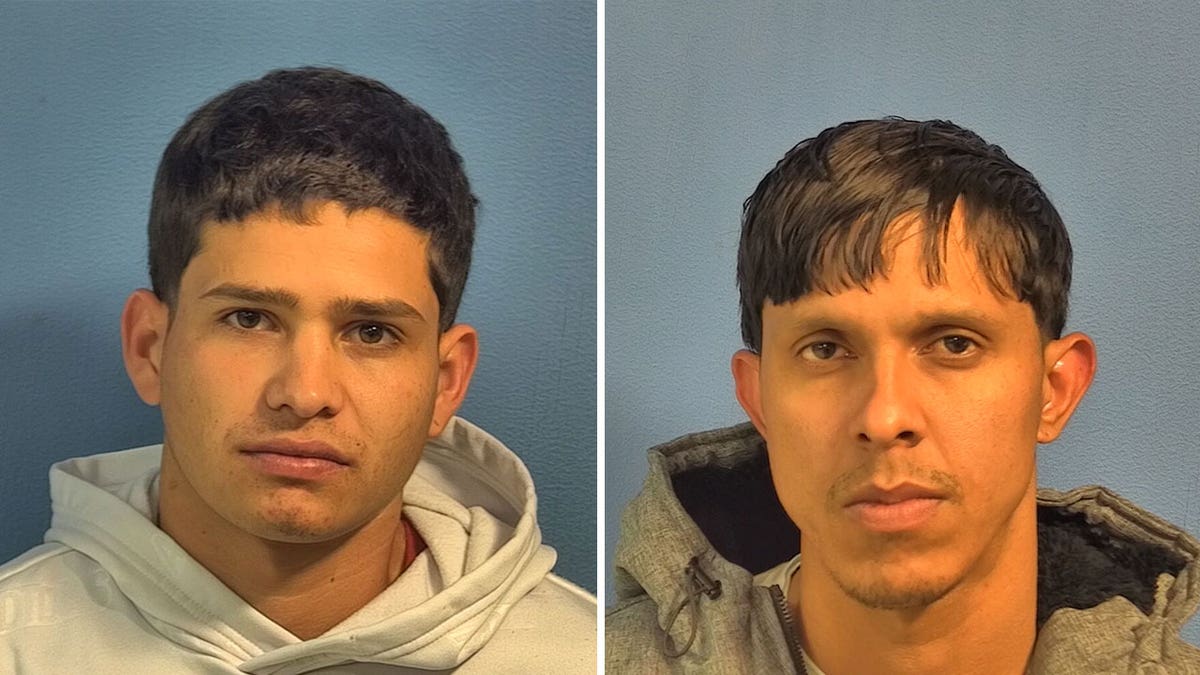
Two Venezuelan migrants – 28-year-old Luis Mendez-Gomez and 23-year-old Frank Montez-Davila – were arrested last October after they allegedly stole nearly $3,000 in high-end cosmetics from the Macy's store in Oak Brook, Illinois. (DuPage County State's Attorney)
The quiet suburbs have been the site of repeated migrant crimes. Oak Brook, Illinois’ Macy’s location was targeted by six migrants in two separate shoplifting incidents on the same day last month, when the suspects reportedly tried to make off with thousands of dollars in merchandise. In both cases, the migrants were granted pre-trial release after a judge denied the state’s motion to hold them in jail.
"I believe that six felony arrests in one day illustrates that migrant criminal activity is a real problem," said Oak Brook Police Chief Brian Strockis said at the time. "The amount of these types of arrests that we have had in the last couple of months is significant and would be taxing for any police department. We are well-prepared to continue our enforcement efforts and I can assure you that there are easier places to commit these crimes than Oak Brook or DuPage County."
CHICAGO FACES BACKLASH FROM RESIDENTS OVER RESOURCES FOR MIGRANTS: 'THEY ARE JUST NOT LISTENING'
Fox News Digital previously reported that between Oct. 23 and Jan. 17, a total of 47 migrants were arrested in Oak Brook, mostly for property-related crimes. Oak Brook is roughly 20 miles from Chicago and is home to about 8,000 people.
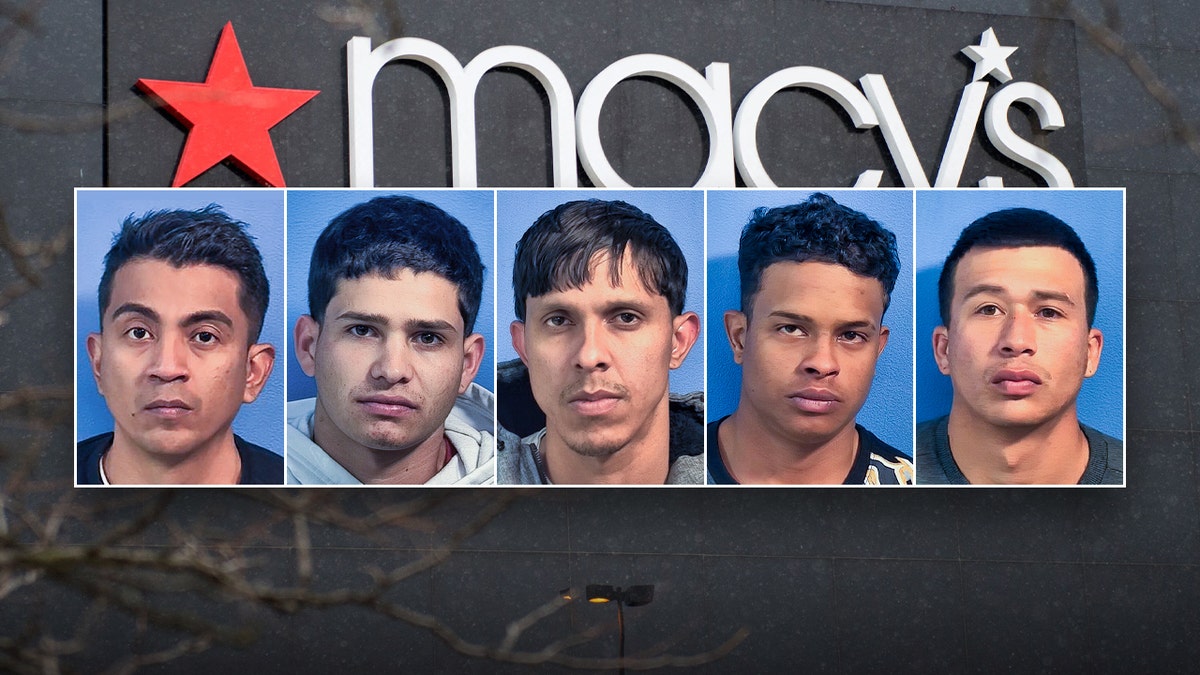
A total of 47 migrants were arrested in Oak Brook, Illinois, for alleged crimes committed from Oct. 23 to Jan. 17, according to Oak Brook Police Chief Brian Strockis. (Getty Images/DuPage County State's Attorney)
"[Criminals are] giving them transportation, directing them to the buses and trains that go out to the suburbs. They're telling them where these high-end retail stores are in the mall, such as Macy's or other types of retail businesses that they don't even know exist," Weitzel said of how migrants even know to target malls like Oak Brooks’ shopping centers.
"That would be like me … being dropped off in the middle of a city in Ecuador. And I wouldn’t know where the grocery stores are, the schools are, a police station. I would know nothing. The same is happening in the city of Chicago," he said.
Weitzel added that in many cases, migrants try to fight police or flee when caught allegedly committing crimes. He pointed to police reports that often detail a foot or vehicle pursuit before a migrant suspect is arrested.
He also said that such crimes could cripple suburban police departments, which often employ just a dozen officers and are not equipped for an influx of arrests and would become overwhelmed.
Strockis told Fox News Digital that some of the migrant arrests were in relation to the theft of products worth more than $10,000, which he said is a "good indicator that they are part of a larger criminal network."
"We have seen arrests where the recovered stolen property was in excess of 10,000 dollars. That would demonstrate that these migrants are not stealing just for themselves because they crossed the border with limited clothing. That’s a good indicator that they are part of a larger criminal network. Additionally, we have had many arrests of migrant offenders that had recent arrests for the same types of crimes in the Chicagoland area," Strockis told Fox News Digital on Monday.
"Clearly, these offenders are not committing one-off crime, but we will continue to enforce the law in a proactive manner in Oak Brook."
In one case last month, the Cook County Sheriff’s Office arrested three men accused of running a fraudulent ID operation in which they allegedly targeted migrants and instructed them to shoplift in exchange for phony IDs.
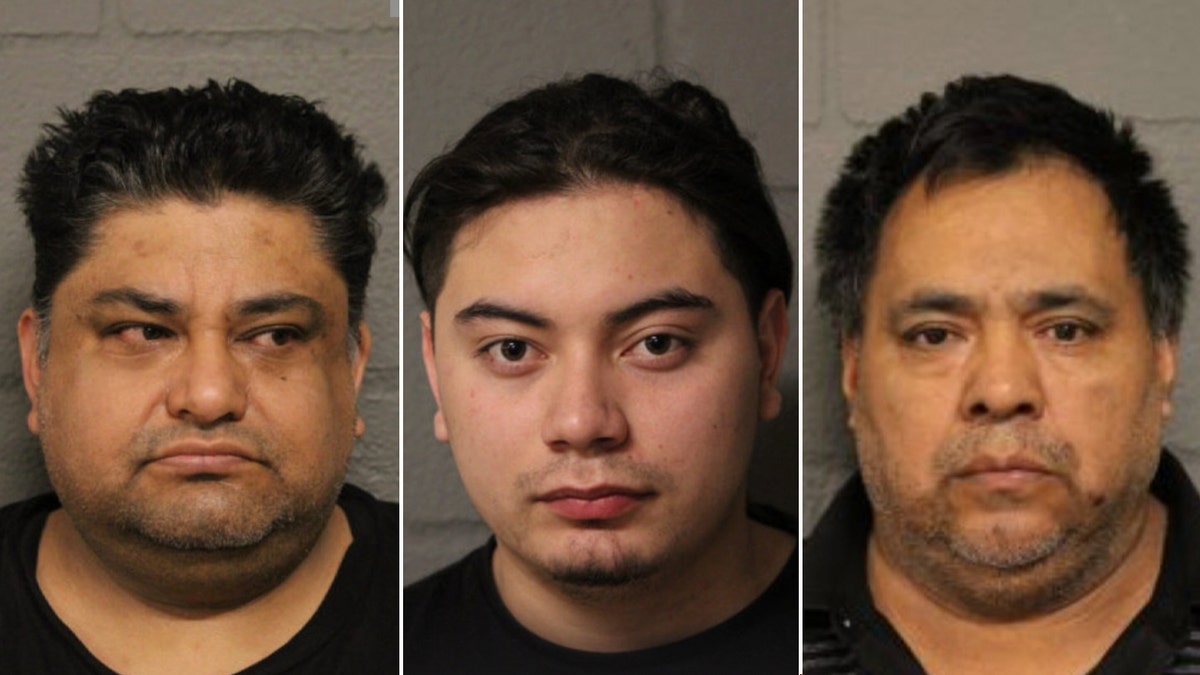
Francisco Otero-Rosas, left, Kenneth Ulloa-Rodriguez and Facundo Meneses-Garcia of Chicago are facing felony charges for obtaining fake ID cards, which police said they sold to other migrants so they could gain employment. (Cooke County Sheriff)
Weitzel said the illegal business of creating fake driver’s licenses or IDs has long been an issue, especially among youths trying to get into bars before their 21st birthday, but that leveraging such an operation to get migrants to commit crime is a new phenomenon.
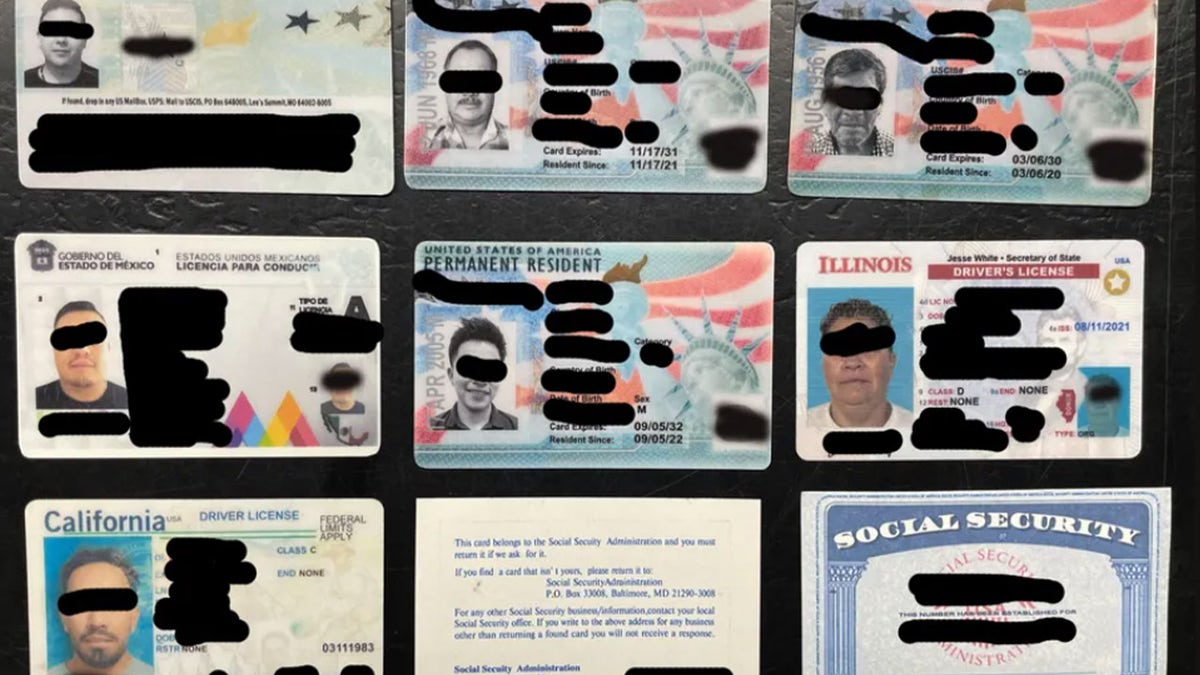
In one recent case, three men were charged with running a fraudulent ID operation in which they allegedly targeted migrants and instructed them to shoplift in exchange for phony IDs. (Cook County Sheriff)
"So, what's happening now is that these individuals arrested by the Cook County Sheriff's police are an organization that's producing these identifications. All of them fictitious state IDs, driver's license, Social Security cards. They're either selling them to the migrants or they're telling them where to go [to] commit the crimes in the suburbs. And then when they sell those proceeds, they give a certain amount of that cash they get to the organization that has produced the fake IDs for them," he said.
Other migrants crossing the border are already affiliated with gangs, Weitzel said, and are helped to cross the border by U.S.-based criminal enterprises.
"These are organizations, mainly in Mexico, that are getting these individuals over the border, and then they have people in place in Chicago and other major cities [who are a part of the] criminal organization that then set out on having some of these individuals, not all migrants, but a majority … out to commit crime," he said.
The criminal organizations aren’t focused just on retail theft but also human trafficking, prostitution and drug running, he said.
"Believe me, these are calculated organizations that know what they're doing. It's not some fly-by-night operations. And there are documented gang members from Mexico and other nations because ICE (U.S. Immigration and Customs Enforcement), the Department of Justice and even local police, Cook County Sheriff's police, are constantly putting out intelligence bulletins to police departments through their networks," he said.
In addition to the migrant crisis coming at a time when U.S. cities are working to correct the wildly violent crime trends of 2020 – when murders nationwide increased by nearly 30% compared to the year prior – Illinois police departments are in the midst of navigating a relatively new law that eliminated cash bail.
Starting in September, judges no longer require suspects charged with crimes to post bail in order to leave jail while they await trial. Suspects deemed a threat to the public or those who are likely to flee can still be required to remain in jail.
ILLINOIS ENDING CASH BAIL A ‘BACKDOOR’ DEFUND MOVEMENT THAT WILL SPARK POLICE EXODUS: EXPERTS
The elimination of cash bail, which was part of the 2021 criminal justice reform bill called the Safety, Accountability, Fairness and Equity-Today (SAFE-T) Act, was set to take effect in Illinois on Jan. 1, 2023, but it was met with fierce legal pushback from dozens of sheriffs and prosecutors in the state who said the law was unconstitutional, diminished public safety and put law enforcement at risk. Amid legal battles, the Illinois Supreme Court ultimately ruled in July that the elimination of cash bail did not violate the state constitution and allowed the law to proceed.
"I was against the SAFE-T Act from day one," Weitzel said. "It's a law now, it's here in Illinois, there's no way for us to avoid it. So, is it affecting all crime in Illinois? I believe, absolutely. And I believe that will bear out when the data comes out over the years."
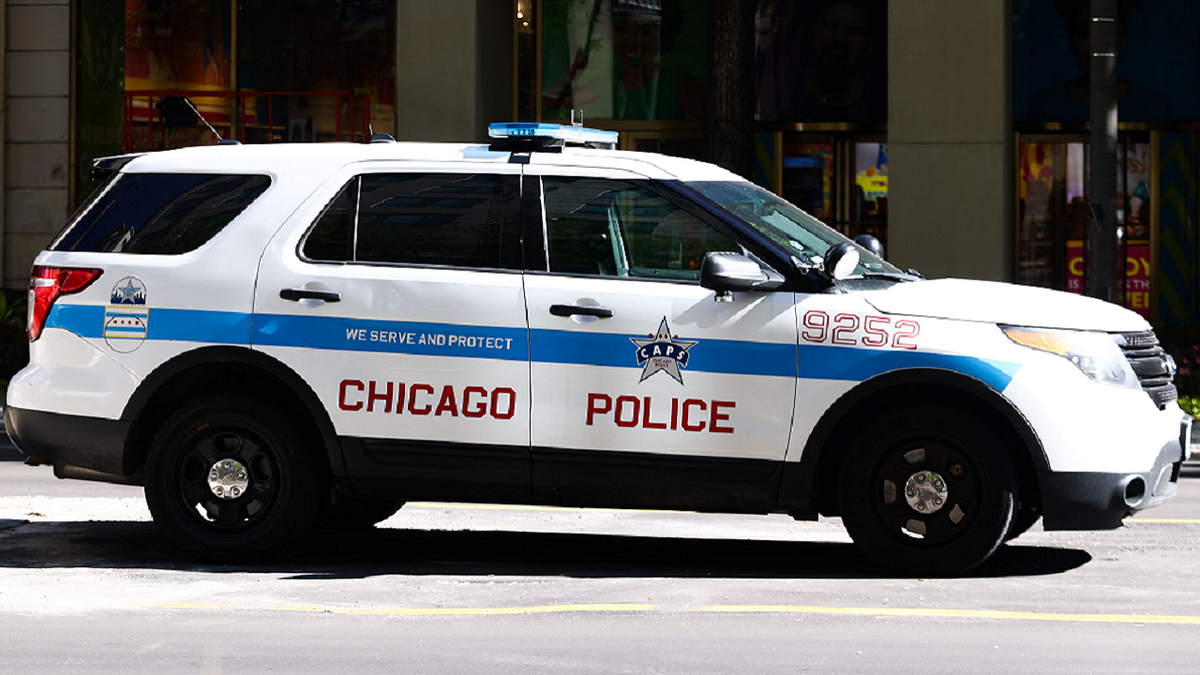
A Chicago Police Department vehicle (Beata Zawrzel/NurPhoto via Getty Images)
Weitzel walked Fox News Digital through how migrants are now processed under the SAFE-T Act if they are arrested for allegedly committing crimes. He said that they are brought into the police station, where officers most often have to find a translator, and then fingerprinted. The migrants often don’t have a criminal record in the state, let alone the country, Weitzel said.
"Illinois, specifically Chicago, will not allow their police officers to contact ICE or other federal organizations because it's a sanctuary city and a sanctuary state. So, we're not allowed to hold individuals on ICE hold, and we're not allowed to communicate. So, if they were in those types of federal databases, we're not going to know. And then they arrest them, process them and release them right back in, because in most cases, the crimes that they commit do not qualify under the SAFE-T Act to hold them. They're released from the police facility," he said.
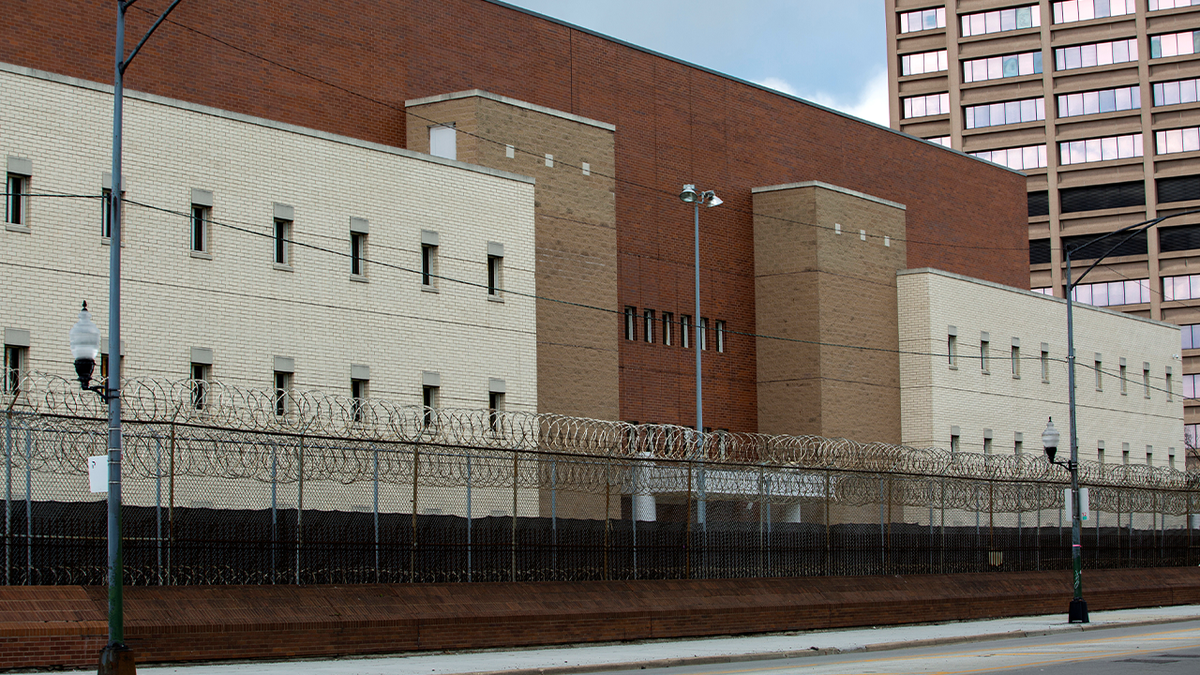
The Cook County Jail in Chicago. (Reuters/Jim Vondruska)
Weitzel added that many of the migrants do not make their bond court hearing, while those who do are "almost always" released back into the public with another court date.
"And remember, they're providing false names, false dates of birth and fictitious addresses because all these migrants that were arrested in the suburbs are listing their addresses as a migrant shelter in the city of Chicago. So, none of that information is factual. So, if a warrant was ever to be put out for these individuals, that warrant is useless," he added.
CLICK HERE TO GET THE FOX NEWS APP
The entire process, Weitzel said, will cause police to throw up their hands and ask "why bother" arresting migrants or criminals if they land right back on the streets to re-offend.
"When the police officers say, ‘Why bother?’ citizens better listen up because there'll be no proactive policing; no policing where officers are out looking for crimes and trying to prevent crimes, not just responding to these crimes [but] actually doing something proactive with it. And when that day happens, I don't think the residents of Illinois really want to see the consequences," he said.











































